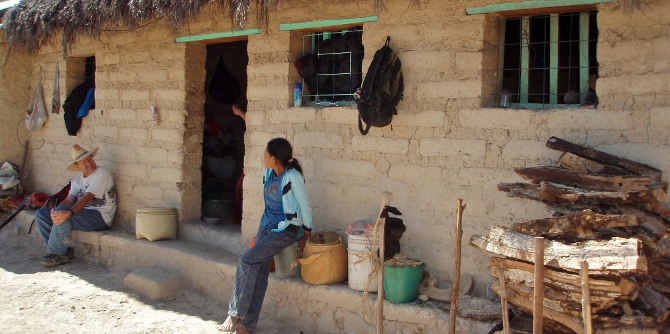 Many communities in Mexico have been deeply affected by the large-scale emigration of workers to the U.S. Abigail Andrews examines the effects of migration on one such village, San Miguel. She finds that far from a source of “freedom,” for this community migration was a source of strain. She writes that with so many people having left the village to work in the U.S., the community’s system of participatory self-government was in crisis. Meanwhile, in the U.S., migrants from San Miguel faced persecution and abuse, since most of them were undocumented immigrants. This drove several migrant women of the village to return home. When the women returned, they took on central roles in local politics, in order to protect their communal way of life and sustain an alternative to living in the United States.
Many communities in Mexico have been deeply affected by the large-scale emigration of workers to the U.S. Abigail Andrews examines the effects of migration on one such village, San Miguel. She finds that far from a source of “freedom,” for this community migration was a source of strain. She writes that with so many people having left the village to work in the U.S., the community’s system of participatory self-government was in crisis. Meanwhile, in the U.S., migrants from San Miguel faced persecution and abuse, since most of them were undocumented immigrants. This drove several migrant women of the village to return home. When the women returned, they took on central roles in local politics, in order to protect their communal way of life and sustain an alternative to living in the United States.
Until 1995, women in the Mixtec village of San Miguel, in the mountains of Oaxaca, Mexico, were not permitted to engage in politics. On the contrary, despite San Miguel’s tradition of participatory self-governance, the village was known for excluding women. While their husbands and fathers conducted civic affairs, women were expected to stay in the home. Yet, today, as one resident put it, “It is the women who run things.” In less than a decade, women, who previously could not even approach the town hall, came to be in charge of school committees, health committees, and government social programs – voting and voicing their opinions publicly for the first time. They did so in the context of mass migration to the United States. To understand the connection, I spent a year living in both San Miguel and among its migrants in California, and I conducted in depth interviews with more than 50 men and women, both in the home village and in the United States. I found that migration played a central role in driving women to take on these new roles. It did so not by inspiring them to echo US gender practices, but instead because they saw migration as a “crisis,” threatening their valued ways of life. Changing gender roles offered them one way to respond.
Early in the research, I learned that every single woman who became a political leader in San Miguel had migrated to – and then returned from – the US. Like almost 90 percent of rural Mexican communities, San Miguel relies heavily on migrant work, mostly on Southern California farms. Its migrants have primarily gone to North County San Diego, an area notorious for its aggressive immigration enforcement. Because they began coming to the U.S. after the last date of legal admission, more than 70 percent remain undocumented (as of 2013), facing aggressive policing and remaining trapped in grueling, low-paying jobs. During my fieldwork in the area, migrants from San Miguel hardly left their homes for fear of arrest or deportation. Many longed to return to Mexico, and women were often the first to go back. Indeed, when I asked women about the connection between their return and participating in politics, they explained that their difficult experiences in the U.S. gave them a renewed commitment to sustaining their village.
When these women got back to San Miguel, they realized that the village itself also faced a crisis. With so many people in the United States, and no one to run the many committees that made up the community’s participatory self-government, it was in danger of falling apart. Even though the women had never been involved in civic affairs before – and even though they saw participation as a lot of work – they realized that someone would have to take responsibility for the village. Therefore, they began soliciting development funding from the state and taking responsibility for new “productive projects.” As they got involved, women also started to challenge the longstanding corruption in the community. Given that government funding was one of their few alternatives to working in the United States, they would no longer tolerate the patterns by which a few village leaders pocketed crucial state funds.

Women did this, they explained, because they dreaded having to go back to California. As embarrassing or taxing as staffing village government might be, it provided their primary hope of sustaining a way of life they had reason to value – and a place where they could live calmly, free of the persecution and abuse that characterized their experiences in the United States. Perhaps surprisingly, men encouraged them in this effort. While men had never included women in politics before, migrant men wanted to return home from the United States as well. Yet they often stayed on as breadwinners. While men continued struggling in California to make ends meet, they realized they needed the women as allies on the ground in the village, to advocate for resources and redistribution in their absence.
The story of San Miguel helps us think differently about how migration can provoke changes in gender relationships. Most research suggests that coming to the United States gives migrant women new life chances: either, scholars argue, they may earn new wages that finally let them stand up to their husbands and fathers. Or, they may see more egalitarian marriages among U.S. couples and be inspired to go home and ask their own male relatives to help do the dishes or sweep the floor. Yet in the example of San Miguel, migration was not a source of “freedom” for most women, but instead a cause of strain. Women and men changed their practices not by imitating people in the U.S., but instead, through their struggles to sustain an alternative way of life to what they saw North of the border. Thus, the story of San Miguel interrupts the idea that low-wage jobs – or exposure to US norms – are in themselves a source of “liberation.” Here, it was the reverse: women gained leverage not because they assimilated, but because they refused to assimilate downward, into an undocumented underclass.
In turn, the process of development in rural Mexico was shaped and reshaped by women’s active responses to the difficulty of living – excluded and exploited – as migrants in the United States.
This article is based on the paper, “Women’s Political Engagement in a Mexican Sending Community: Migration as Crisis and the Struggle to Sustain an Alternative,” in the August 2014 issue of Gender & Society.
A version of this article previously appeared on the Gender and Society blog.
Please read our comments policy before commenting.
Note: This article gives the views of the author, and not the position of USApp– American Politics and Policy, nor of the London School of Economics.
Shortened URL for this post: http://bit.ly/1oXx86e
_________________________________
 Abigail Andrews – University of California – San Diego
Abigail Andrews – University of California – San Diego
Abigail Andrews is an Assistant Professor of Sociology and a faculty member in the Urban Studies and Planning Program at the University of California, San Diego. She studies the politics of migration, development, and gender, and the interrelationships between Mexico and the United States. She can be found at http://abigailandrews.com.






